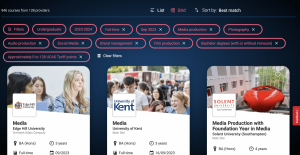Choosing what you do after your sixth form or college studies is one of the biggest decisions in your life, and, if done correctly, can ensure you get to where you want to in life. It’s a choice for life.
Being certain in your next steps and choosing what you want to do is something that you should be passionate about for you to get the best out of it. If you choose something you don’t enjoy or aren’t sure what you want to do it can be difficult to feel that you have made the right choice, and that it is somewhere that you want to spend the next 3+ years at.
I started by asking myself the following questions. Where do I want to be in 20 years? What do I want to learn? What options do I want after the degree? This helped me to know what degree I’d need, what I would need to study and what other opportunities that pop up on the way that I might need.
Surface level research – The initial step in figuring out what you want.
Create a mind map of the subject(s) you are interested in, with all of the aspects you are interested in (if you have more than one similar subject, you can link the maps, and highlight the similarities).
Search the areas/subjects that you’re interested in can also help you to find more you might be interested in, or help you get rid of some you have less interest in.
This will help when you are searching for courses, and you can do this on UCAS website.  I then identified the courses and universities I was interested in, and then started researching them on their website. I also looked at some videos posted by students at the universities.
I then identified the courses and universities I was interested in, and then started researching them on their website. I also looked at some videos posted by students at the universities.
Researching in depth and choosing courses
I then started to make tables to look at all the information about each university. This made it easier for me to highlight and compare the courses and universities. The first table consisted of all the information (accommodation, course units, entry requirements, societies etc), which I duplicated to make a second table. In this second table, I gave each category a percentage weighting, and then ranked each uni in that category out of 10. This gave me a total score that would help me decide where was the best choice.
Make applications for the most you can, you don’t know what you might be offered. Once you have received your offer(s), look firmly at: the options post-degree, how will the course be assessed and the course outlines, what the financial implications are (transport, housing, location). If you can, speak to a current student on that course, or any course to see what they think. You want a university that can tick as many boxes as possible.
Go to the campus to visit. Go on a tour or a self-guided tour, or do a virtual tour, just so you can get a sense of what it would feel like.
Don’t be afraid to do a Foundation Year for more preparation.
It is important to look at your options after the degree. Some courses may give limitations with jobs or postgraduate courses that you might be interested in.
Keep some courses on reserve, as when it gets closer to results day, it can be reassuring to look at what options may be available, should you not get the grades you hoped for.



 Let’s talk courses…
Let’s talk courses… Dear Diary, I missed the UCAS application deadline!
Dear Diary, I missed the UCAS application deadline! Why BA (Hons) Television Production at BU was the right choice for me
Why BA (Hons) Television Production at BU was the right choice for me My experience of applying through Clearing
My experience of applying through Clearing








